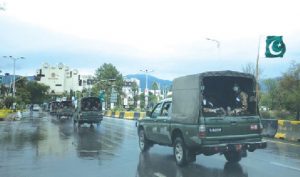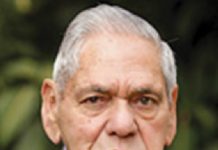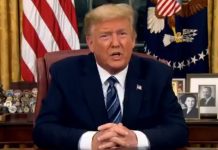 The Pakistani army chief General Qamar Javed Bajwa talks to his core commanders, moves troupes to lockdown the country, while the civilian government under Prime Minister Imran Khan had declined to take effective steps to control the corona virus. The decision of the armed forces to take effective measures to tackle the spread of the deadly virus shows that the civilian government’s inaptitude, and also reasserting Bajwa’s position in the army and the government. Early this year, the law was amended to ensure Bajwa’s extension till 2022 with the support of the all major political parties had ended the close alliance between Imran Khan and the GHQ, the army headquarters. With the retirement of the eight generals by the end of the current years, Bajwa will emerge as powerful as Zia-ul-Haq, the amry dictator who had ruled the country with iron hands and had hanged the civilian elected popular prime minister, Z.A. Bhutto through a sham judicial process.
The Pakistani army chief General Qamar Javed Bajwa talks to his core commanders, moves troupes to lockdown the country, while the civilian government under Prime Minister Imran Khan had declined to take effective steps to control the corona virus. The decision of the armed forces to take effective measures to tackle the spread of the deadly virus shows that the civilian government’s inaptitude, and also reasserting Bajwa’s position in the army and the government. Early this year, the law was amended to ensure Bajwa’s extension till 2022 with the support of the all major political parties had ended the close alliance between Imran Khan and the GHQ, the army headquarters. With the retirement of the eight generals by the end of the current years, Bajwa will emerge as powerful as Zia-ul-Haq, the amry dictator who had ruled the country with iron hands and had hanged the civilian elected popular prime minister, Z.A. Bhutto through a sham judicial process.
The deployment of the army as an institution serving the common man may also help in improving the image of the forces. On the issue of the lockdown, the Pakistani media is fragmented. Only among the senior journalists, Najam Sethi, appears to be in support of Khan, but others are almost have confronted Khan for his failure to take effective steps in tackling the crisis. Meanwhile, Pakistan has sought a sum of US$1.4 billion from the International Monetary Fund (IMF) to deal with the economic slowdown. Apart from the financial assistance from the IMF, the govenrment’s financial advisor, Abdul Hafeez Shaikh has also approached the Aiusan development Bank for financial assistance. The total assistance may be more than US$ 3.7 billion, while the country is still under the grey list for its failure to stop financing to the terrorists and their outfits.
The army deployment has happened much against the much-pronounced policy of Prime Minister Imran Khan that there was no need to lockdown the country. The forces’ initiative is a follow-up of the ongoing confrontation between the Khan government and media amidst the virus crisis becoming much more challenging with each passing day. The return of the Pakistan Muslim League –Nawaz (PML-N) President Shehbaz Sharif is going to be yet another headache for Khan, though some Pakistani channels have ruled out any political activity from Shehbaz, who is also a younger brother of the former Prime Minister Nawaz Sharif.
Confrontation with journalists
Amidst these developments, Khan has already opened a front against journalists by getting Editor-in-Chief of the Jang and Geo Media Group, Mir Shakil-ur-Rahman, arrested. Rahman is one of the few Pakistani journalists known worldwide and had played a key-role during the “Aman-ki-Asha” movement forging friendship between India and Pakistan. He is also respected for objective journalism.
It is not surprising that this arrest of a highly respected journalist under some trumped up charges of “grabbing land” by the National Accountability Bureau (NAB), Khan’s assertion that he stands for media freedom is now under suspicion. His inability to face aggressive questions from the media has further eroded his credibility. Rauf Klasra, one of the senior journalists, asked why his government could not take precautionary measures before the countrywide spread of the deadly Corona Virus. The sharp interaction between the journalists and the prime minister ended the press conference with a bitter note. It was soon followed by the Khan supporters on the social media calling Rauf Klasra a “barking dog” and an agent of the land grabber, Mir Shakil-ur-Rahman.
The Khan’s clash with media began when he lost cool on the issue of lackluster efforts of his government for managing the impending crisis. He even has threatened to cancel an all-important press conference after journalist Irshad Bhatti asked for comments on the restrictions that have been placed on the media in Pakistan by the federal government. Another senior journalist Rauf Klasra too was humiliated when he asked Khan to comment on the unprecedented restrictions on the media. He, however, refused to answer the question, instead claiming that the media in Pakistan was freer than the media in western democracies.
Pakistan’s Isolation
Imran Khan’s inability to participate on Sunday, March 15, in the video summit of the South Asian Association for Regional Cooperation (SAARC) comprising Afghanistan, Bangladesh, Bhutan, India, Maldives, Nepal, Pakistan and Sri Lanka has exposed his inability to understand the gravity of the situation. It was natural for the Indian side to describe Pakistan’s low-key participation “churlish” for politicizing a humanitarian issue, but the Pakistani media did not endorse the deploying Health Minister Zafar Mirza, State Minister for Health, who appeared to be quite uncomfortable at the summit. Instead of discussing cooperation among nations to tackle the virus, Mirza raised the lockdown in Jammu and Kashmir.
It is natural for people to discuss that Khan has a peculiar mindset, which is only focused against India and Modi. His absence could not be justified, because if the Nepali Prime Minister KP Sharma Oli, could be present, why he did not participate. It may be noted that Sharma was discharged only on Saturday from the hospital after undergoing a kidney transplant. Apart from Modi and Sharma, Sri Lankan President Gotabaya Rajapaksa, Maldivian President Ibrahim Mohamed Solih, Bhutanese premier Lotay Tshering, Bangladeshi Prime Minister Sheikh Hasina and Afghan President Ashraf Ghani participated in the video conference. The underlying message of the video conference was for a united effort to take on the pandemic. It is also interesting to note that Pakistan has not paid any contribution to the SAARC fund for tackling the menace.
Shehbaz Sharif in Pakistan
The political situation in Pakistan further became challenging for the Khan government with the return of Shehbaz. He was expected to arrive in Pakistan only after his niece, Maryam’s return to London to look after Nawaz Sharif, which was being opposed by the Khan’s government. His arrival is likely to upset Imran Khan and his cronies, who have so far failed to end the standoff with the opposition parties. He has also missed a dialogue with India on tackling the virus menace in the region.
Shehbaz is known for working out political relationship with the Pakistani army. He may not take up any political campaign in near future, but he may re-script the political relationship with the country’s power centre, GHQ, the army headquarters. By refusing permission to Maryam to visit her ailing father Nawaz in London, Khan’s has lost much of his shine as a politician and ruler.
On the other hand, Shehbaz, who had reportedly declined to replace his brother as prime minister, is expected to be playing a pivotal role in the murky Pakistani politics. He reportedly had convinced his brother, Nawaz, and niece Maryam to support the army chief, General Qamar Javed Bajwa’s extension in the Pakistani National Assembly.
Shehbaz, who has been chief minister of Punjab (Pakistan), is known as a seasoned politician like his brother. Soon after his arrival he asked in his press briefing that the prime minister utilize the media effectively for coping with the challenge of the corona virus. His appeal is significant amidst the demand from people from all walks of life expressing their displeasure over the illegal detention of Mir Shakil-ur-Rahman. “As a measure of goodwill, the prime minister should release Geo/Jang group’s head Mir Shakilur Rehman on bail,” he said, adding that this gesture would bring positive results for the government’s fight against the epidemic as the number of confirmed cases of the virus rose.
letters@tehelka.com












